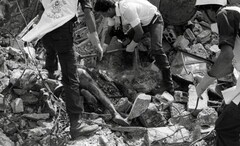The Electronic Intifada 23 September 2004

John Dugard
Victor Kattan: Twenty years ago you published an article entitled, “Israel and the International Community: The Legal Debate” in the South African Yearbook of International Law after you had visited Israel and the Occupied Palestinian Territories. Has the legal landscape changed since you published this paper in 1984 and since you became Special Rapporteur in 2001? If so, how has it changed?
John Dugard: Strangely the legal issues have not changed much over the last twenty years. Oslo has been and gone. And the same type of human rights violations still occur, albeit with a new severity. The two major changes are, first, that the need for Palestinian statehood has been recognized. Second, the wall. The significance of the wall cannot be overrated. It shows convincingly that the issue is land and expansion. Of course, it must be seen in the context of settler expansion.
Victor Kattan: Many commentators and political activists compare the situation in Apartheid South Africa to the situation in the Occupied Palestinian Territories. How are these two unjust systems, apartheid in South Africa and prolonged military occupation in Palestine, comparable, and how are they different?
John Dugard: Apartheid was a form of colonialism, but at the same time it had some of the characteristics of occupation. Nevertheless the similarities between the two systems should not be exaggerated. Palestine is subject to military occupation. The IDF is an occupying army. Israel is determined to assert control while at the same time taking land. In South Africa the issue was political control and how to achieve this while at the same time pretending to comply with international standards of self determination. Of course, many of the human rights violations were similar. Suppression, torture, restrictions on freedom of movement, denial of social and economic rights, population relocations etc. So although different in character, many of the consequences were similar.
Victor Kattan: In May 2004 you called on the international community to impose an arms embargo on Israel in response to “Operation Rainbow” which resulted in numerous deaths and the destruction of civilian infrastructure, including a zoo and a number of refugee camps. You cited the 1977 Arms embargo imposed on South Africa in support of your statement. In the end Israel was condemned by the UN Security Council which asked Israel to desist from destroying civilian infrastructure but no arms embargo was imposed on Israel. What was the reaction to your statement in the international arena and amongst the academic community and why did the international community not impose an arms embargo on Israel?
John Dugard: There is no possibility of sanctions being imposed against Israel; at least at present. South Africa alienated itself from all five of the veto powers and this allowed limited sanctions to be imposed. Israel will, it seems, for ever have the USA to veto any sanctions being imposed by the Security Council. I raised the issue simply to get it into the debate so that it is on the table. I have had no feedback whatsoever.
Victor Kattan: In the light of the International Court’s 14-1 advisory opinion on the illegality of the Wall and the General Assembly’s resolution passed in the wake of the Courts’ advisory opinion, what must now be done to ensure that Israel abides by its international commitments and responsibilities if, as is expected, the USA vetoes a planned Security Council resolution asking Israel to comply with the Court’s advisory opinion? What impact would that have on the integrity of the Court?
John Dugard: The Security Council will not enforce the ICJ opinion. The USA will ensure this. I believe it is necessary to see the ICJ opinion on the wall in the same light as the 1971 opinion on Namibia. It is a statement on the law of the UN. The General Assembly must repeatedly remind Israel of its obligations. Regular attempts should be made to get the Security Council to act. It seriously delegitimizes Israel’s policies and I believe it will have the desired effect…in time. However, already it is being taken more seriously by Israel than I had anticipated. The Israeli High Court has asked Government to clarify its position on the Opinion. A good start.
Victor Kattan: As a white South African who opposed apartheid in South Africa, do you ever get a feeling of déjà vu when your work is criticized by the Government of Israel, a government which does not hide its dislike for the UN, ignores its resolutions, world public opinion and treats the International Court with disdain?
John Dugard: I certainly have a sense of déjà vu. The sad thing is that Israel is unwilling to learn from the South African precedent. A state cannot indefinitely stand against the world.
Victor Kattan is a correspondent for Arab Media Watch and an occasional contributor to the Electronic Intifada. You can reach Victor at writekattan@yahoo.co.uk





